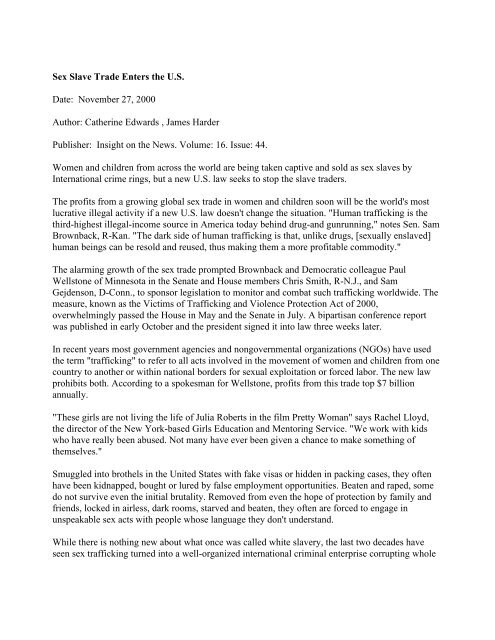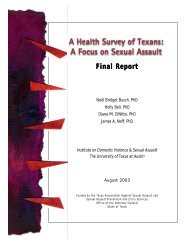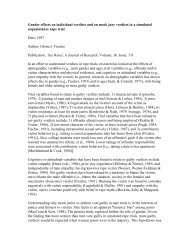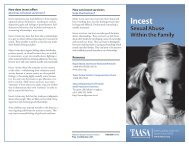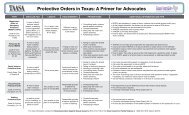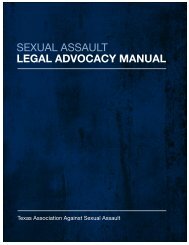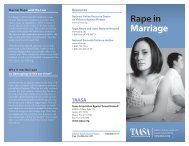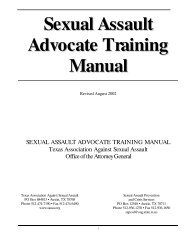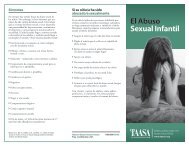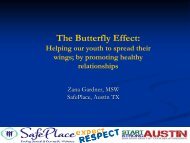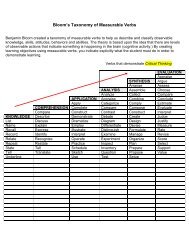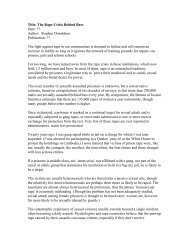Sex Slave Trade Enters the US
Sex Slave Trade Enters the US
Sex Slave Trade Enters the US
Create successful ePaper yourself
Turn your PDF publications into a flip-book with our unique Google optimized e-Paper software.
<strong>Sex</strong> <strong>Slave</strong> <strong>Trade</strong> <strong>Enters</strong> <strong>the</strong> U.S.<br />
Date: November 27, 2000<br />
Author: Ca<strong>the</strong>rine Edwards , James Harder<br />
Publisher: Insight on <strong>the</strong> News. Volume: 16. Issue: 44.<br />
Women and children from across <strong>the</strong> world are being taken captive and sold as sex slaves by<br />
International crime rings, but a new U.S. law seeks to stop <strong>the</strong> slave traders.<br />
The profits from a growing global sex trade in women and children soon will be <strong>the</strong> world's most<br />
lucrative illegal activity if a new U.S. law doesn't change <strong>the</strong> situation. "Human trafficking is <strong>the</strong><br />
third-highest illegal-income source in America today behind drug-and gunrunning," notes Sen. Sam<br />
Brownback, R-Kan. "The dark side of human trafficking is that, unlike drugs, [sexually enslaved]<br />
human beings can be resold and reused, thus making <strong>the</strong>m a more profitable commodity."<br />
The alarming growth of <strong>the</strong> sex trade prompted Brownback and Democratic colleague Paul<br />
Wellstone of Minnesota in <strong>the</strong> Senate and House members Chris Smith, R-N.J., and Sam<br />
Gejdenson, D-Conn., to sponsor legislation to monitor and combat such trafficking worldwide. The<br />
measure, known as <strong>the</strong> Victims of Trafficking and Violence Protection Act of 2000,<br />
overwhelmingly passed <strong>the</strong> House in May and <strong>the</strong> Senate in July. A bipartisan conference report<br />
was published in early October and <strong>the</strong> president signed it into law three weeks later.<br />
In recent years most government agencies and nongovernmental organizations (NGOs) have used<br />
<strong>the</strong> term "trafficking" to refer to all acts involved in <strong>the</strong> movement of women and children from one<br />
country to ano<strong>the</strong>r or within national borders for sexual exploitation or forced labor. The new law<br />
prohibits both. According to a spokesman for Wellstone, profits from this trade top $7 billion<br />
annually.<br />
"These girls are not living <strong>the</strong> life of Julia Roberts in <strong>the</strong> film Pretty Woman" says Rachel Lloyd,<br />
<strong>the</strong> director of <strong>the</strong> New York-based Girls Education and Mentoring Service. "We work with kids<br />
who have really been abused. Not many have ever been given a chance to make something of<br />
<strong>the</strong>mselves."<br />
Smuggled into bro<strong>the</strong>ls in <strong>the</strong> United States with fake visas or hidden in packing cases, <strong>the</strong>y often<br />
have been kidnapped, bought or lured by false employment opportunities. Beaten and raped, some<br />
do not survive even <strong>the</strong> initial brutality. Removed from even <strong>the</strong> hope of protection by family and<br />
friends, locked in airless, dark rooms, starved and beaten, <strong>the</strong>y often are forced to engage in<br />
unspeakable sex acts with people whose language <strong>the</strong>y don't understand.<br />
While <strong>the</strong>re is nothing new about what once was called white slavery, <strong>the</strong> last two decades have<br />
seen sex trafficking turned into a well-organized international criminal enterprise corrupting whole
countries. Such traffic began to flourish in <strong>the</strong> Philippines and Thailand after <strong>the</strong> Vietnam War --<br />
first catering to soldiers and <strong>the</strong>n to sexual holidays for Japanese, American, Canadian and<br />
European men frequenting bro<strong>the</strong>ls in Sou<strong>the</strong>ast Asia. After <strong>the</strong> collapse of <strong>the</strong> Soviet Union,<br />
Russian women were targeted by <strong>the</strong>se criminal enterprises.<br />
Prior to <strong>the</strong> 1990s, many of <strong>the</strong> women trafficked into <strong>the</strong> United States came from Asia. While <strong>the</strong><br />
nationality and character of victims now varies greatly, researchers cite a common socioeconomic<br />
profile of <strong>the</strong> women caught up in this trade. Often <strong>the</strong>y are desperate young people in search of<br />
opportunity, livelihood and sometimes even a means to survive. The breakup of <strong>the</strong> Eastern bloc,<br />
for instance, created economic dislocation and destitution for many young women that made <strong>the</strong>m<br />
vulnerable to <strong>the</strong> ploys and schemes of bro<strong>the</strong>l owners and traffickers. Porous borders, globalization<br />
and cooperation among criminal syndicates also contributed to <strong>the</strong> explosive growth during <strong>the</strong> last<br />
decade, say leading experts.<br />
Marie Jose Ragab sees <strong>the</strong> fall of <strong>the</strong> Berlin Wall and <strong>the</strong> ensuing growth of organized crime in<br />
Eastern Europe as landmark events in <strong>the</strong> proliferation of sex trafficking. As <strong>the</strong> international<br />
director for a dissident chapter of <strong>the</strong> National Organization for Women, she has spent years looking<br />
at issues related to sex trafficking. "Before, it was through mail-order brides and making trips to<br />
Thailand and Asia," Ragab says of <strong>the</strong> international sex trade. "Once <strong>the</strong> Soviet Union collapsed,<br />
organized crime took over and <strong>the</strong>re was a new market. Suddenly <strong>the</strong>re were all of <strong>the</strong>se<br />
Western-looking girls on <strong>the</strong> market."<br />
Ian Vasquez, director of <strong>the</strong> Project on Global Economic Liberty at <strong>the</strong> libertarian Cato Institute in<br />
Washington, acknowledges that globalization may have played a role in facilitating sex traffic, but<br />
he is quick to point out that <strong>the</strong> development of <strong>the</strong> global economy is not <strong>the</strong> issue. Vasquez says<br />
Communist policies in Eastern Europe largely were responsible because "past policies have<br />
impoverished people and taken away many or all <strong>the</strong> benefits" of <strong>the</strong>ir industry and savings,<br />
creating <strong>the</strong> desperation and criminality from which this traffic springs. As a result <strong>the</strong> Russian<br />
Federation, Ukraine and Hungary have been producing a flood of desperate victims for <strong>the</strong> sex<br />
traffickers.<br />
Laura Lederer of <strong>the</strong> Protection Project, a program affiliated with Johns Hopkins University, has<br />
been organizing international police records and tracking <strong>the</strong> main routes of <strong>the</strong> sex trade for <strong>the</strong> last<br />
three-and-a-half years. When charted, <strong>the</strong> maps look like flight routes for a major airline, covering<br />
much of Africa, Sou<strong>the</strong>ast Asia, Eastern Europe and South America. But shutting down those routes<br />
has been extremely difficult, says Lederer, because of hesitancy by many countries even to<br />
acknowledge <strong>the</strong> problem. "We mainly track through police and journalistic reports, and if <strong>the</strong><br />
police don't ask <strong>the</strong> right questions during <strong>the</strong> investigation it's that much more difficult to know<br />
what's going on," says Lederer.<br />
A report being prepared by <strong>the</strong> National Center for Missing and Exploited Children (NCMEC),<br />
which is due out early next year, may help shed light on how trafficking in children as sex slaves<br />
has been added to this international trade. Christine Dolan, a Washington-based freelance journalist,
ecently was commissioned by NCMEC to spend nine weeks investigating <strong>the</strong> trafficking of<br />
children in Europe, especially in <strong>the</strong> Balkans. "I hung out with pimps, whores, kids, transvestites<br />
and police. I walked <strong>the</strong> streets and I saw this stuff firsthand. It's a huge, huge problem" Dolan tells<br />
Insight.<br />
After a close look at <strong>the</strong> situation, Dolan is adamant that government bureaucracies and research<br />
institutions have a long way to go before <strong>the</strong>y even have a remote grasp of <strong>the</strong> magnitude and<br />
volume of <strong>the</strong> problem. But it is <strong>the</strong> age of <strong>the</strong> children being trafficked and forced into prostitution<br />
that she finds most shocking. "What's nearly impossible for people to understand" she says, is that<br />
even "toddlers and infants are being kidnapped and sexually molested" -- as a business.<br />
Ernie Allen, president of NCMEC, tells Insight that kids increasingly are being used for sexual<br />
activity and trafficking because even perverts fear HIV/AIDS. "The profile that we have developed<br />
on this," he says, "is that we have seen kids exploited and in <strong>the</strong> stream of child trafficking as young<br />
as 3 and 4 years old. This is not just a by-product of pedophilia or some sort of sexual attraction to<br />
younger kids. Part of this is that because of <strong>the</strong> AIDS epidemic <strong>the</strong>re is a demand for younger and<br />
younger kids because of <strong>the</strong> thought that <strong>the</strong>y would be less likely to be HIV-positive." Allen likens<br />
<strong>the</strong> magnitude of sex trafficking to <strong>the</strong> Holocaust, noting that it has spread throughout <strong>the</strong> world.<br />
The new U.S. law proposes to address part of this problem. It will require <strong>the</strong> State Department to<br />
expand <strong>the</strong> annual human-rights reports to cover severe forms of trafficking in persons, and an<br />
interagency task force chaired by <strong>the</strong> secretary of state will coordinate antitrafficking efforts<br />
nationally and internationally. The law also provides for allied public-awareness campaigns at home<br />
and abroad through NGOs.<br />
"The biggest thing this law does is say to <strong>the</strong> world that <strong>the</strong> United States sees this as a serious<br />
human-rights issue. It raises public awareness about <strong>the</strong> dangers of trafficking and <strong>the</strong> protections<br />
available for victims," Brownback tells Insight.<br />
A more controversial provision addresses <strong>the</strong> immigration status of trafficked victims. As many as<br />
5,000 aliens trafficked into <strong>the</strong> United States by organized-crime syndicates will be permitted to<br />
remain on a new nonimmigrant visit provided <strong>the</strong>y assist in <strong>the</strong> investigation of <strong>the</strong>ir perpetrators,<br />
are younger than age 15 or can demonstrate that <strong>the</strong>y would suffer severe harm if returned to <strong>the</strong>ir<br />
country of origin. The president also can impose nontrade, nonhumanitarian sanctions against<br />
countries that do not comply with minimum standards to eliminate trafficking. The countries that<br />
currently have no laws against forced labor and prostitution will have four years to enact such laws<br />
before application of sanctions, but all sanctions can be waived by <strong>the</strong> president at any time.<br />
Finally, <strong>the</strong> new law provides for stiff punishment of traffickers who in <strong>the</strong> past have received light<br />
sentences. As Wellstone put it on <strong>the</strong> Senate floor: "In Los Angeles, traffickers kidnapped a Chinese<br />
woman, raped her and forced her into prostitution, posted guards to control her movements and<br />
burned her with cigarettes. Never<strong>the</strong>less, <strong>the</strong> lead defendant received only four years and <strong>the</strong> o<strong>the</strong>r<br />
defendants received only two to three years."
The maximum sentence for dealing in small quantities of <strong>the</strong> drug LSD is life in prison. Under <strong>the</strong><br />
new law, <strong>the</strong> penalty for trafficking kids younger than age 14 is life; if caught trafficking a person<br />
ages 14 to 18, <strong>the</strong> perpetrator faces at least 20 years behind bars. The penalty for traffickers who kill<br />
or attempt to kill a victim is life in prison.<br />
Rep. Smith was adamant that <strong>the</strong> law be given <strong>the</strong> teeth to bite <strong>the</strong> big players who are facilitating<br />
this international shame. "We have to put <strong>the</strong>se mafioso types away for life. Get some high-level<br />
convictions ... and throw away <strong>the</strong> key. They're facilitating <strong>the</strong> rape of <strong>the</strong>se young girls, sometimes<br />
10, 15 times a day," he tells Insight.<br />
Congress has appropriated almost $100 million to various government agencies to implement <strong>the</strong><br />
new law. And Janis Gordon, assistant U.S. attorney for <strong>the</strong> Organized Crime Strike Force in<br />
Atlanta, tells Insight that this indeed will help her prosecute <strong>the</strong> traffickers more effectively.<br />
Last summer Gordon's office busted an Asian smuggling and prostitution ring. Women and girls as<br />
young as age 13 had been trafficked as sex slaves to Atlanta from China, Thailand, Korea, Malaysia<br />
and Vietnam. Before she had time to question <strong>the</strong> girls about <strong>the</strong>ir detention, however, <strong>the</strong><br />
Immigration and Naturalization Service (INS) had deported <strong>the</strong>m to <strong>the</strong>ir countries of origin.<br />
"Because all my witnesses were gone, I was not able to prove coercion," Gordon tells Insight. "The<br />
INS wouldn't let me hold <strong>the</strong>m here, so <strong>the</strong> maximum sentence any of <strong>the</strong> traffickers got was 33<br />
months." Gordon says <strong>the</strong> new immigration provisions in <strong>the</strong> trafficking legislation allow witnesses<br />
to remain in <strong>the</strong> United States to assist with investigations.<br />
"This is big business for <strong>the</strong> traffickers who don't get caught," says Gordon. "After examining one<br />
bro<strong>the</strong>l's records, I was able to show that it grossed $1.5 million over a two-year period. The girls<br />
were shuttled around <strong>the</strong> country to o<strong>the</strong>r bro<strong>the</strong>ls, forced to work in dire conditions, only allowed<br />
to run errands if accompanied by armed guards until <strong>the</strong>y paid off <strong>the</strong>ir contracts to <strong>the</strong>ir captors,<br />
which could be as much as $30,000 in value."<br />
As more women are trafficked into <strong>the</strong> United States every year, <strong>the</strong>y not only violate U.S.<br />
immigration, labor and prostitution laws, but also can become a national-security threat by<br />
streng<strong>the</strong>ning corrosive elements abroad, says former CIA director James Woolsey. "Trafficking is<br />
a lucrative source of income for organized crime, often less risky than drug smuggling" Woolsey<br />
tells Insight. "If countries do not effectively prosecute [slave] traffickers, organized crime assumes a<br />
stronger role which in turn corrupts law enforcement and <strong>the</strong> rule of law -- which is not good for <strong>the</strong><br />
overall economic stability of <strong>the</strong>se countries, thus creating a national-security threat to <strong>the</strong> United<br />
States."<br />
One human-rights group that is working to help free trafficked women and children from bro<strong>the</strong>ls<br />
abroad and to put <strong>the</strong>ir traffickers behind bars is <strong>the</strong> International Justice Mission (IJM), which<br />
works with police, NGOs and faith-based groups at <strong>the</strong> local level to document abuses and assist in<br />
conducting <strong>the</strong> raids. IJM investigator Bob Mosier is a former police officer and served with <strong>the</strong>
international police task force in Bosnia. He and his team have participated in more than 12 raids<br />
since January 1999 and assisted in 25 raids on bro<strong>the</strong>ls in Asia. Women trafficked against <strong>the</strong>ir will<br />
from Nepal to India or from Burma to Thailand were found by Mosier's team locked by <strong>the</strong>ir captors<br />
in dark rooms.<br />
"Some of <strong>the</strong>se women had been sold into prostitution by <strong>the</strong>ir own families and were afraid to<br />
return home," Mosier tells Insight. The problems we face when freeing some of <strong>the</strong>se girls is that,<br />
unless <strong>the</strong>re is a church or NGO willing to take <strong>the</strong>m in, <strong>the</strong>re is nowhere for <strong>the</strong>m to go. They don't<br />
speak <strong>the</strong> language in order to find work, and often <strong>the</strong>y are poor, uneducated and lack skills. Out of<br />
fear some return to <strong>the</strong> bro<strong>the</strong>l simply because <strong>the</strong>y have food and shelter <strong>the</strong>re."<br />
Mosier says he sees a great deal of government corruption at <strong>the</strong> national and local levels<br />
concerning sex trafficking. "But most international governments are concerned that children are<br />
being sexually exploited and want to do something to stop it. Even so, most of <strong>the</strong> in-country laws<br />
still do not treat human traffickers as harshly as drug smugglers," he says. Mosier, who recently<br />
returned from <strong>the</strong> Philippines, opens a file and points to a Filipino immigration card. Written on it in<br />
red letters are <strong>the</strong> words: "Drug Trafficking in <strong>the</strong> Philippines is punishable by death." Not so for<br />
traffickers in human beings.<br />
Meanwhile, in October, a U.N. Crime Commission finished negotiations on a new international<br />
treaty to combat trafficking in slaves. Delegates wrangled for months over language and <strong>the</strong><br />
definition of treaty terms. The outcome changed little of <strong>the</strong> existing 1949 U.N. treaty that<br />
condemns trafficking with or without individual consent for sexual purposes, and national laws<br />
regarding prostitution will not be affected. Countries may sign <strong>the</strong> new document starting in<br />
December.<br />
Meanwhile, <strong>the</strong> independent action taken in <strong>the</strong> United States is likely to have more effect. Smith<br />
says <strong>the</strong> new law marks a historic day in <strong>the</strong> struggle to protect women from violence. The 10-term<br />
Republican says he saw <strong>the</strong> problem of sex trafficking begin exploding in <strong>the</strong> 1980s, but it wasn't<br />
until he attended a Commission for Cooperation and Security in Europe, held in St. Petersburg,<br />
Russia, two years ago that he realized <strong>the</strong> severity of <strong>the</strong> problem. "Just looking in <strong>the</strong> eyes of those<br />
girls ...," says Smith, breaking off his thought in mid-sentence. Momentarily flustered, he pauses<br />
before launching back into <strong>the</strong> opportunities for prosecution afforded under <strong>the</strong> new law he helped<br />
write.<br />
Lederer is similarly touched by <strong>the</strong> great outrage. She says that <strong>the</strong> number of women and children<br />
who have been trafficked for sexual exploitation during <strong>the</strong> last 10 years already is on a par with<br />
estimates of <strong>the</strong> number of Africans who were enslaved for sale in <strong>the</strong> United States during <strong>the</strong> 16th<br />
and 17th centuries. "The minimum number of African slaves transported here was between 5<br />
million and 6 million," says Lederer. "There is no doubt that world trafficking [in sex slaves] now is<br />
around that number."<br />
RELATED ARTICLE: The <strong>Sex</strong> <strong>Trade</strong> and HIV/AIDS
International Justice Mission investigator Bob Mosier met <strong>the</strong> 17-year-old girl in Bombay. A virgin<br />
kidnapped from her village in West Bengal at age 14, she was drugged and woke up in a bro<strong>the</strong>l<br />
where she was beaten and forced to have sex as many as 25 times a day. By age 17 she had<br />
undergone three abortions, which she had to pay for with tips from <strong>the</strong> long lines of clients she was<br />
made to service.<br />
For three years <strong>the</strong> teen-ager repeatedly tried to escape. Now she has AIDS and will be allowed by<br />
<strong>the</strong> traffickers to go home to die, Mosier tells Insight.<br />
"A virgin like her can cost a customer more than $10,000," he says. "Some mistakenly assume that<br />
sex with a virgin can purify <strong>the</strong>m of AIDS. O<strong>the</strong>r customers with AIDS do not like to use condoms<br />
and spread <strong>the</strong> disease that way. Governments need to be concerned about this trade from a<br />
humanitarian point of view but also from a public-health point of view -- and I don't see that<br />
happening."<br />
-- CE


